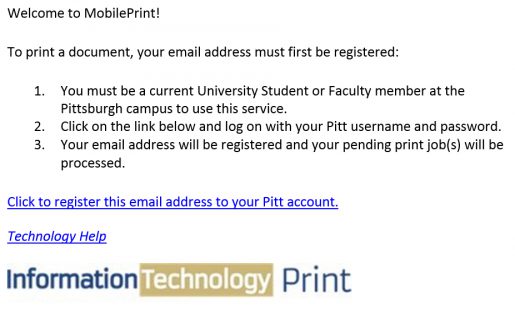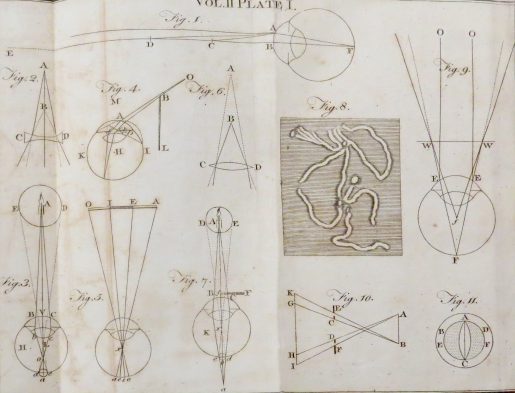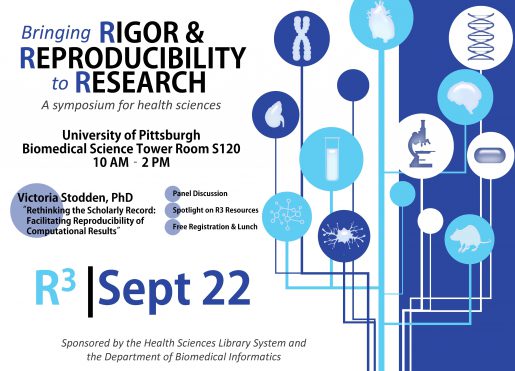The Health Sciences Library System and the Department of Biomedical Informatics is sponsoring a one day symposium, Bringing Rigor and Reproducibility to Research, on Thursday, September 22, 2016, from 10 a.m.–2 p.m., in BST S120.
Locate Research Protocols, Techniques, and Methods as Easy as 1, 2, 3
Whether you are looking to validate an experimental protocol used in your lab or to master a new technique, the following three resources can help you locate research protocols, techniques, and methods to meet your needs.
1. The Protocols tab in the search.HSLS.MolBio search box
The library subscribes to a number of experimental protocol resources including Cold Spring Harbor Protocols, Current Protocols, Journal of Visualized Experiments (JoVE), and SpringerProtocols.
Click on the Protocols tab in the search.HSLS.MolBio search box to quickly search all these resources at once. Results are clustered by major topics based on the query with the option to “remix” the search results to see more subtle topics that did not appear the first time. Continue reading
MobilePrint at Falk Library
Printing from your phone or tablet is a snap using Pitt’s MobilePrint service. MobilePrint is an easy way for Pitt faculty and students to send print jobs to the self-service print stations on campus. From any device or computer, send an email to mobileprint@pitt.edu, with either an attachment or the text you’d like to print in the body of the email. When you swipe your Pitt ID or log in at the print station, you can release your prints.
The first time you use MobilePrint, you’ll be prompted to register via email:

Any email address can be used, and the one-time registration will associate the email you’re using with your Pitt account. Once registered, your first print job will process.
If you’d like to print more than one document, you should attach each document to a separate email. If you’re printing the text in the body of an email, it must be 400 characters or longer.
MobilePrint currently only supports double-sided and black-and-white printing. Very large files, 2MB or greater, may generate an error. For more details on using the MobilePrint service, please visit the CSSD FAQ page.
Two self-service print stations are located in Falk Library: one on the main floor, across from the stairwell, and one on the upper floor, next to the stairwell. If you have questions about using the self-service printers at Falk Library, please stop by the Technology Help Desk on the upper floor, or call 412-648-9109.
~Julia Dahm
Treasures from the Rare Book Room: Porterfield on the Eye
The most recent addition to the HSLS rare book collection is a first edition of William Porterfield’s Treatise on the Eye, the Manner and Phaenomena of Vision, published in Edinburgh in 1759.

William Porterfield (ca.1696-1771) was a Scottish physician. Like many of his contemporaries he studied in Glasgow and Leiden before he received his MD from Rheims in 1717. Upon his return to Scotland, he was admitted as a Fellow to the Royal College of Physicians of Edinburgh (1721), appointed a professor (1724), and later its president (1748-1750). Not much is known about his private life, nor how and when he became interested in optics, but he is the author of pioneering work on the physiology of the eye. He wrote articles about external (1737) and internal (1738) eye movements and also described the first optometer for measuring the near and far points of vision. However, it was his book, Treatise on the Eye, the Manner and Phaenomena of Vision, that made him an authority on vision. It was praised by ophthalmic historians as one of the most erudite works, far ahead of others of similar scope. Its greatest strength lay in its numerous original experiments and observations about visual physiology. According to Garrison, his Treatise on the Eye, “was the first important British work on the anatomy and physiology of the eye.” (Garrison-Morton 1484.2)
Porterfield also gave us the earliest first hand doctor’s account of phantom limbs after his leg was amputated. He incorporated his phantom limb experiences into his account of sensory function.
This book is a gift from Dr. E. Kenneth Vey, a local physician, former professor in the School of Medicine, and past president of the Pittsburgh Ophthalmology Society. Prior to Vey’s ownership, the “office copy” belonged to other prominent practitioners from the area. The book also bears the stamp of the so called Vattemare’s agency in Paris. Vattemare’s was the international book exchange program established by Library of Congress in 1848. Allexandre Vattemare was the author of the exchange system and the first agent of the Library of Congress.
~Gosia Fort
HSLS Staff News
The HSLS Staff News section includes recent HSLS presentations, publications, staff changes, staff promotions, degrees earned, etc.
Publications
Author names in bold are HSLS-affiliated
Jonathon Erlen, history of medicine librarian published “American Indian Dissertation Abstracts” in Indigenous Policy Journal, 28(1): 2016. Co-author was Jay Toth.
Classes August 2016
HSLS offers classes on database searching, software applications such as Prezi, bibliographic management, and molecular biology and genetics. For more information, visit the online course descriptions.
Classes are held on the first floor of Falk Library (200 Scaife Hall) in Classroom 1 and on the upper floor of the library in Classroom 2. All classes are open to faculty, staff, and students of the schools of the health sciences at the University of Pittsburgh, who will need a valid Pitt ID or e-mail account. They are also open to UPMC residents and fellows, who will need to show their UPMC IDs. Continue reading

